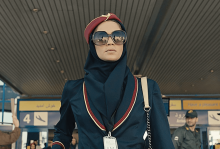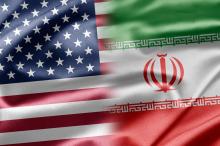tehran

THE POWER OF the TV drama Tehran, about an Israeli spy who was born in Iran to a Jewish family and returns to her birthplace to help destroy a nuclear reactor, lies partly in how it parallels reality. On the other side of the screen, President Joe Biden continues to face the fallout of President Donald Trump’s decisions to withdraw the United States from the Iran nuclear deal and recognize Jerusalem as the capital of Israel, while tensions between Iran and Israel simmer.
But relevance alone doesn’t win an International Emmy Award for Best Drama. With her lifelong ties to both Israel and Iran, Tehran’s hacker-agent Tamar Rabinyan is a unique protagonist, and Tehran perfectly executes the thrills and twists that draw people to the spy genre. The show also is violent—guns, blood, an attempted rape that ends with the killing of the attacker, and a shot of a man hanged from a crane, presumably executed by the government. The more I watched, the more I felt a pang in my chest, wondering whether Rabinyan would survive.
Tehran is not all stress, though—at least not for the viewer. Rabinyan’s family members become entangled with the show’s plot in a pleasurably Shakespearean fashion, mirroring each other and possessing information their kin may not know but the viewer does. A romance grows between Rabinyan and an Iranian hacker named Milad. When the show pauses the action to linger on characters and personal relationships, we can reflect on the humanity of Muslim and Jewish lives. Even clichéd techniques provide this opportunity, such as a scene in slo-mo—which I would have foregone for regular-speed footage—of Iranian university students protesting restrictions imposed by their government as other students counterprotest in support of the government’s conservative stance.

Iranian dissident Mohsen Kadivar and his wife, Zahra “Nikoo” Roodi, have seen it all before.
On. Feb. 16, the couple embraced after Kadivar’s hasty return from Berlin, where last month he had begun what he expected would be a semester-long fellowship.
Instead his plans were cut short by President Trump’s travel ban.
1. At Least 10 Religious Groups Have Come Out Against Anti-LGBT 'Religious Liberty' Laws
"While substantial attention has been paid to the lawmakers, athletes, businesses, and celebrities who have challenged the new laws, less has been said about the steady flow of criticism from the exact group these RFRAs are ostensibly designed to protect: people of faith."
2. Stress and Hope in Tehran
On Thursday, the U.S. and Iran along with five world powers reached a preliminary deal that would curb Iran’s nuclear program and address sanctions imposed upon the country. The New York Times offers this glimpse into what those sanctions mean for ordinary Iranians.
3. Outcry Over RFRA Might Be a Fear of Christians
"The outcry isn’t about the law, it’s about us. It’s a fear that we will discriminate. And it is a fear based on a history that, whether we like it or not, is ours. We have, in no shortage of ways, broken relationships with the LGBTQ community. We have expelled our sons and daughters. We have protested them. We blamed them for the ills of society like a scapegoat. And no matter what we believe about same-sex marriage, that is wrong. Because of that, restoring relationship and trust with the LGBTQ community is on us."
4. Why I Won't Wear White on My Wedding Day
"As far as we have come, and as removed from these traditions’ origins as we may be, we are still attached to these remnants of a woman’s worth and identity being grounded in her sexual activity, importantly solely for the purposes of her pleasing a man."

AT LAST, AFTER more than 30 years of isolation since the Islamic Revolution of 1979 overthrew the U.S.-installed Shah, American and Iranian officials are talking to each other. The late September telephone conversation between President Obama and Iranian President Rouhani was an important first step. If the two sides can reach an agreement on ending the nuclear standoff, it could pave the way for other forms of cooperation that could significantly improve regional and global security.
Because of the historical mistrust between the United States and Iran that goes at least as far back as the 1954 CIA-backed coup that overthrew Iran’s democratically elected prime minister, achieving progress will require diplomatic flexibility on both sides. The core objectives of the international community are to prevent Iran from developing nuclear weapons and to guarantee that its nuclear program is solely for peaceful purposes. This can be accomplished by convincing Tehran to accept binding limits on its nuclear program and by robust monitoring mechanisms to guarantee the absence of military-related activities.
Iran’s objectives are to gain international acceptance of its right to develop nuclear energy, including uranium enrichment, and to obtain relief from crippling sanctions. If Tehran takes steps toward accepting limits and agreeing to enhanced transparency and monitoring, Washington should offer an initial partial suspension of sanctions and pledge to lift additional sanctions as progress proceeds. This would help jump-start the talks and strengthen President Rouhani’s hand in the face of hardliners.
UPDATES: Earlier today (Friday, Sept. 30), the Iranian Embassy in the U.K. issued the following statement regarding Pastor Nadarkhani:
I have been doing my best to keep up with the ongoing events in Iran. I don't know enough to truly understand the nuances of the election or the political science behind it all, but like many others, I've been caught up in the human drama of it all. Photos like this one literally brought tears to me eyes.
There is the Islam of the dictators and their religious allies, used to keep people in their place, used to justify their own power, used to shame and threaten those who question their authority. And there is the Islam of the protestors, calling out to God in hopes of liberation. Whose prayers are heard? Which group has a more true vision of God?